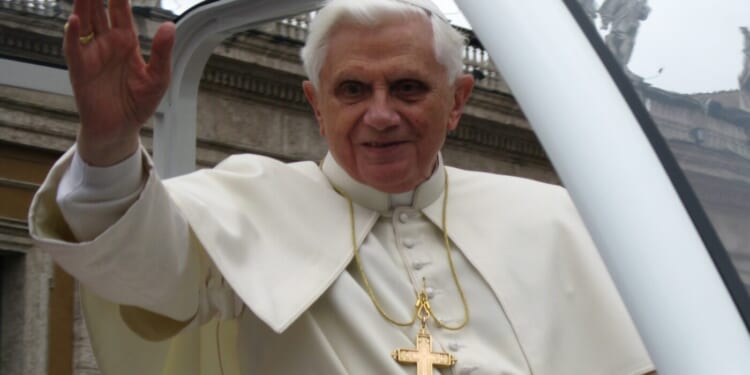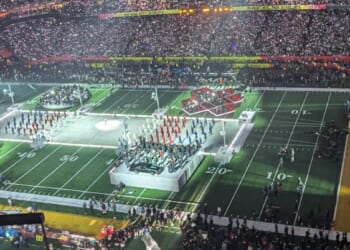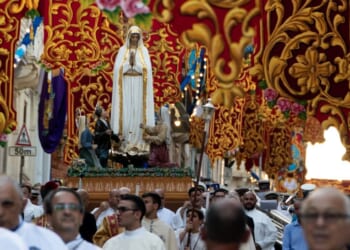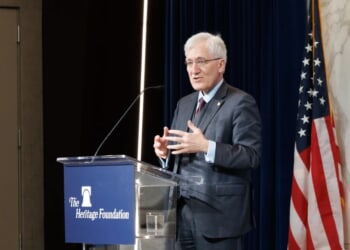Joseph Ratzinger, later Pope Benedict XVI, was a theologian, academic, writer, and historian of Christianity who understood Providence deeply. Providence is the theme of the Psalms, indeed the entirety of the Bible; it was the theme in St. Augustine’s historical works, Confessions and City of God; it was stubbornly recognized by the Renaissance humanist Montaigne; it became the life’s work of Jean-Pierre Caussade; it was recognized by American theologians and martyrs such as Michael Portier and Stanley Rother; it is revealed to us in the Marian apparitions such as Our Lady of Guadalupe; and even so brilliant a historian and scholar as Joseph Ratzinger never doubted it either: God’s presence is among us.
Ratzinger’s faith carried him through many trying times. When Nazi totalitarianism dominated Europe, Ratzinger was forced to serve in the German military. He then lived through the terror of the Cold War and the emergence of skeptical atheism in the European academic world. He was one of the intellectuals behind Vatican II, when the Church met the challenges of the modern world and stuck to the basic beliefs of Christianity, such as the presence of God’s will even in a harrowing and confusing world.
One of Ratzinger’s most succinct expressions of his historical philosophy, which includes his faith in Providence, is the book Eschatology: Death and Eternal Life, published in English in 1988. Eschatology deals with the most terrifying aspect of life and the most confusing teachings of Christianity.
Existence, Death, and Eternity
Death is ever present among us, and although one would expect Christians to be comfortable with the idea of death, it is precisely the opposite: death continues to terrify, and in our world increasingly focused on medicine, notwithstanding that God’s will is present, people try to stave it off as long as they can.
Why? Because of what death represents. For some, it is simple nothingness. For Christians, it is either heaven or hell (or purgatory, as Catholics know). But how and why? In death, does a person go straight to heaven or hell? Does the person fall asleep awaiting Christ’s return in the Judgment? What can an understanding of providence inform us about these questions?
Ratzinger opens the book with a powerful statement of his theme: “We live because we are inscribed into God’s memory. In God’s memory we are not a shadow, a mere recollection.” Ratzinger argues that this life in God’s memory is one throughout time, not just during the waking and breathing of a human during circumscribed years. God’s will is with us throughout all time.
For some, providence means that right now, and in each moment, God is holding our hand. But Ratzinger argues that providence means an eternity of moments in which we experience the kingdom of God.
Human existence in time with Christ, the Son of Man, the Logos, brings us into God’s scheme of history in which “the walls separating heaven and earth, and past, present, and future, are now as glass.” In other words, the dead are not asleep—the dead are not no longer in time, not no longer in history, but are still a part of time, a part of history, hence subject to divine providence. Christ is “the Son in whom the unbridgeable between already and not yet is spanned.”
Moreover, “eternity is not commensurable with time, being of a wholly other order.” Eschatology does not refer to time, but rather to existence. Life eternal is life indestructible. Christianity is therefore “an ever renewed act of encounter” in a timeless moment. Life eternal is authentic, “purifying and transforming.”
As so many of the ancient philosophers taught, death is an opening and suffering is an acceptance of what is to come; otherwise, “man’s own truth is that he passes away, having no abiding existence in his own right. The more he takes a stand on himself, the more he finds himself suspended over nothing.”
Christ represents all time, all history, the entire Creation, the unification of body and soul. “Dying in Christ” is to be alive, a part of the whole, the entire cosmos, a part of all history, all time. Jesus, Emmanuel, God is with us: “if the human capacity for truth and for love is the place where eternal life can break forth, then eternal life can be consciously experienced in the present.” Further, “eternal life does not isolate a person, but leads him out of isolation into true unity with his brothers and sisters and the whole of God’s creation.” What this means is that “an eternity with a beginning is no eternity at all. Someone who has lived during a definite period of time, and died at a definite point in time, cannot simply move across from the condition ‘time’ into the condition ‘eternity,’ timelessness.”
On Purgatory
Ratzinger was heavily influenced by Augustine’s theory of time, of memory of the past, awareness of the present, and expectation of the future. Augustine, he argued, believed that our memory continues after death, hence our connection to the ongoing movement of time continues, which for Ratzinger is clarified by the idea of purgatory:
The guilt which goes on because of me is a part of me. Reaching as it does deep into me, it is part of my permanent abandonment to time, whereby human beings really do continue to suffer on my account, and which, therefore, still affects me.
In addition, “love cannot…close itself against others or be without them so long as time, and with it suffering, is real”—hence love ties us to the present suffering of humans even after death. Purgatory then is:
…unresolved guilt, a suffering which continues to radiate out because of guilt. Purgatory means, then, suffering to the end what one has left behind on earth—in the certainty of being definitively accepted, yet having to bear the infinite burden of the withdrawn presence of the Beloved.
The Mystical Body of Christ
The Body of Christ means that “every human being exists in himself and outside himself: everyone exists simultaneously in other people. What happens in one individual has an effect upon the whole of humanity, and what happens in humanity happens in the individual.”
Why pray for the dead, or ask for the prayers of the saints, Ratzinger asked, if the dead (including the saints) are asleep, awaiting the Judgment? Rather, “even when they have crossed over the threshold of the world beyond, human beings can still carry each other and bear each others’ burdens.”
Ratzinger argued that after Vatican II the tendency has been to discount the soul, separating it from time, assuming that resurrection occurs in the moment of death. But he believes that there is no interruption in life between death and the end of the world. This is because humans are anima forma corporis, an essence, an indestructible life form; a human is “the creature…for whom the vision of God is part and parcel of his very being.”
Providence is this vision of God. Under God’s providence, the dead continue to be connected with the passage of time toward the Judgment; and the transition from life to death still waits upon God’s will.
Image from Wikimedia Commons










